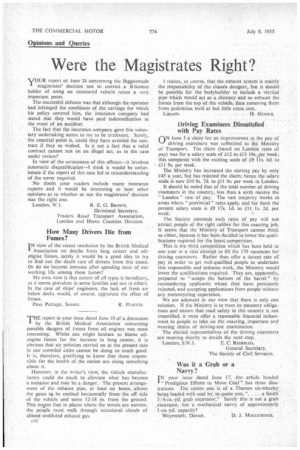Were the Magistrates Right?
Page 62

If you've noticed an error in this article please click here to report it so we can fix it.
'YOUR report at June 24 concerning the Biggleswade 1 magistrates' decision not to convict a B-licence, holder of using an uninsured vehicle raises a very important point.
The successful defence was that although the operator had infringed the conditions of the carriage for which his policy covered him., the insurance company had stated that they would have paid indemnification in the event of an accident.
The fact that the insurance company gave this voluntary undertaking seems to me to be irrelevant. Surely, the essential point is, could they have avoided the contract if they so wished. Is it not a fact that a valid contract cannot rest on an illegal act, as in the case under review?
In view of the seriousness of this offence—it involves automatic disqualification--1 think it would be unfortunate if the report of this case led to misunderstanding of the cover required.
No doubt your readers include many insurance experts and it would be interesting to hear other opinions as to whether or not the magistrates' decision was the right one.
London, W.I. R. E. G. BROWN, Divisional Secretary, Traders Road Transport Association, London and Home Counties Division.
How Many Drivers Die from Fumes?
IN view of the recent resolution by the British Medical
Association on deaths from lung cancer and oilengine fumes, surely it would be a good idea to try to.firid out the death rate of drivers from this cause. Or do We become immune after spending most of our working life among these fumes?
My own view is that cancer of all types is hereditary, as it seems prevalent in some families and not in others. In the case of ships' engineers, the laek of fresh air below decks would, of course, aggravate the effect of fumes.
Peas Pottage, Sussex. R. PESCUO.
THE report in your issue dated lune 10 of a discussion by the British Medical Association concerning possible dangers of fumes from oil engines was most interesting. Whilst one might hesitate to blame oilengine fumes for the increase in lung cancer, it is obvious that air polution carried on at the present rate in our crowded cities cannot be doing us much good.
It therefore, gratifying to know that those responsible for the health of the nation are doing something about it_ However, in the writer's view, the Vehicle manufacturers could do much to alleviate what has become a nuisance and may be a danger. The present arrangement of the exhaust pipe, at least on buses, allows the gases to he emitted horizontally from the off side of the vehicle and some 12-18 in. from the ground. This means that in places where the streets are narrow, the people must walk through occasional clouds of almost undiluted exhaust gas.
1 realize, oi course, that the exhaust system is mainly the responsibility of the chassis designer, but it should • be possible for the bodybuilder to include a vertical. pipe which would act as a chimney and so exhaust the fumes from the top of the vehicle, thus removing them from pedestrian level at but little extra cost, Lincoln. H. MONKS.
Driving Examiners Dissatisfied with Pay Rates
(IN June 3 a claim for an improvement in the pay of
driving examiners was subtnitted to the Ministry of Transport. The claim (based on London rates of pay) was for a salary scale of £12 to £13 19s, per week; this Compared with the existing scale of £9 I Is. 6c1. to 411 9s. per week.
The Ministry has increased the starting pay by only £45 a year, hut has rejected the claim; hence the salary scale is now £10 9s. 7d. to in 9s. per week in London.
It should be noted that of the total number of driving examiners in the country, less than a sixth receive the " London" rate of pay. The vast majority works in areas where " provincial " rates apply, and for them the present salary scale is £9 17s. Id. to LI I Is. 2d, per week: The Society contends such rates of pay will not attract people of the right calibre for this exacting job. It seems that the Ministry of Transport cannot think so either, because it has been decided to lower the qualifications required for the latest competition.
This is the third competition which has been held in one year in a vain attempt fO fill the 170 vacancies for driving examiners. Rather than offer a decent rate of pay in order to get well-qualified people to undertake this responsible and arduous work, the Ministry would lower the qualifications required. They are, apparently, prepared to "scrape the bottom of the barrel" by reconsidering applicants whom they have previously rejected, and accepting applications from people without any motorcycling experience.
We are adamant in our view that there is only one solution. If the Ministry is to meet its statutory obligations and ensure that road safety in this country is not imperilled, it must offer a reasonable financial inducement to people to take on the exacting, important and wearing duties of driving-test examination.
The elected representatives of the driving examiners are meeting shortly to decide the next step.
London, S.W.]. E. C. REDHEAD,
Gerleral Secretary,
The Society of Civil Servants.
Was it a Grab or a Navvy?
IN your issue dated June 17. the article headed . " Prodigious Efforts to Move Coal" has three illustrations. The centre one is of a Thames six-wheeler. being loaded with coal by, to quote you, ". . . a Smith 3/4-cu.-yd. grab excavator." Surely this is not a grab ,excavator, but a mechanical navvy of approximately 1-cu.-yd. capacity?
Weymouth, Dorset. D. J. MOGGERIDGE.




















































































































